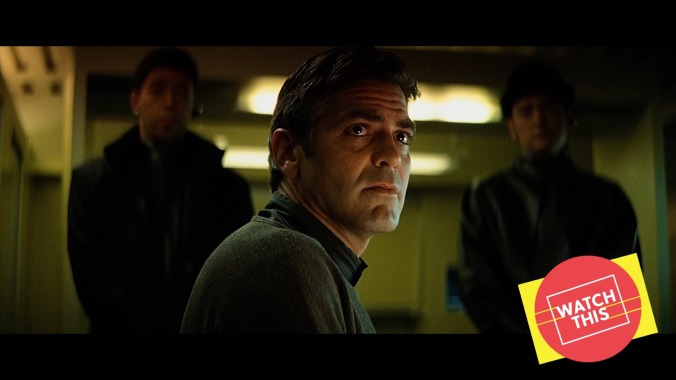George Clooney did some of his best work in Steven Soderbergh’s reviled Solaris

Watch This offers movie recommendations inspired by new releases, premieres, current events, or occasionally just our own inscrutable whims. This week: With Voyagers now in theaters and Stowaway on Netflix next week, we’re looking to the stars for five days of space movies.
Solaris (2002)
If asked to select a terrestrial-bodied representative of American space exploration, many film fans would probably opt for Tom Hanks, star of Apollo 13 and producer of the From Earth To The Moon miniseries. But George Clooney has made even more space-centric movies. Tracking backward from his recent directorial project The Midnight Sky, he’s also played astronauts in the megahit Gravity and, a decade or so earlier, the big-budget flop Solaris. In the latter, Clooney undermines both his image as a dashingly controlled charmer and the notion that these qualities might make him an ideal big-screen explorer. It leads him to one of his best, most vulnerable, least-seen performances.
Clooney plays Dr. Chris Kelvin, a psychologist hired to investigate unspecified problems with the crew of a space station orbiting the mysterious planet Solaris. Once there—the movie is set far enough into the future that a solo space trip doesn’t seem like a big deal—Kelvin makes contact with talkative, demonstrative Snow (Jeremy Davies) and the more forbidding Gordon (Viola Davis). Oh, and Kelvin’s wife, Rheya (Natascha McElhone), who has been dead for years. Solaris, it seems, can create physical beings out of human memories, something realer than a simulation but more dreamlike than a pure resurrection. Snow and Gordon have both experienced this phenomenon—as have other crew members who are now dead or disappeared. At some point, Kelvin’s mission begins to resemble a psychological experiment: Can he conceive of this living, breathing memory of Rheya as distinct from the real person he once knew? Will the planet destroy him from the inside?
Clooney, too, is taking part in a bold experiment: This Solaris is Steven Soderbergh’s version of the classic 1972 sci-fi film by Andrei Tarkovsky (or his re-adaptation of the original 1961 novel by Stanisław Lem). At the time, the Clooney/Soderbergh team was following up their ebullient take on Ocean’s 11 with a redo of material both less familiar to American audiences and more beloved by those who did know it. In Soderbergh’s telling, the broad strokes of the story are similar, and more immediately understandable than Tarkovsky’s version; the dialogue sometimes errs on the side of over-explication, and the movie runs a full hour shorter. Yet this is still light-years away from what most audiences might expect from a sci-fi picture starring Clooney (produced by no less of a showman than James Cameron!).
Though much of the movie is set on the space station, Soderbergh flashes back to snippets of Kelvin and Rheya’s marriage, scenes that suggest the famous Out Of Sight sex scene drawn out past the moment of seduction, into disappointment and clinical depression. Soderbergh also uses strategies that seem intentionally alienating (2002 was the filmmaker’s biggest audience-alienation year in a while; it also saw the release of his little-loved comedy Full Frontal). In many of the two-person dialogue scenes, especially those set on the space station, he keeps performers from sharing the frame. Instead, the camera will focus on one actor, while the other’s voice addresses them from off-camera or out of focus, like an unseen interviewer—or, more appropriately, a ghostly presence in the visible actor’s head.
This technique might fragment the small cast, but the performances persevere. Davis is powerful in one of her first major roles, and Davies gives perhaps the definitive Jeremy Davies performance while no one is looking, practically writing his lines in the air with his hands. Clooney, meanwhile, is even more impressive as a man confronting the terror of his own weaknesses: He revisits, in those vivid flashbacks, the failings of his marriage, then sees them brought back to life as a woman whose existence is dependent on his inherently limited understanding of her. Even when Clooney has played outright boobs, they tend to be boobs with a plan, however harebrained. It’s unnerving to watch a Clooney character with so little authority, and so much panic in his eyes.
Maybe too unnerving for a mainstream movie. Soderbergh’s streamlining of Tarkovsky made no difference in terms of accessibility, at least during its initial run. Upon arrival in 2,400 movie theaters, Solaris was greeted with pitiful grosses and the rare “F” CinemaScore, and the passage of time still hasn’t exactly made it one of Soderbergh’s more beloved experiments. But if it’s not as immersive as the Tarkovsky film, it deserves to be seen for its cerebral, melancholy tone (and, for the sci-fi nerds, some pretty cool, drawn-out ship-docking scenes). It lacks Gravity’s razzle-dazzle, yet it would double-feature well with that more conventionally exciting feature; both movies use the infinite abyss of outer space as a way of testing their characters’ grief-stricken limits. Despite the movie’s pauses for regrets and anguish, Solaris still sails into the great unknown.
Availability: Solaris is available to rent or purchase from Amazon, Google Play, Apple, YouTube, Microsoft, Fandango, Redbox, DirecTV, and VUDU.